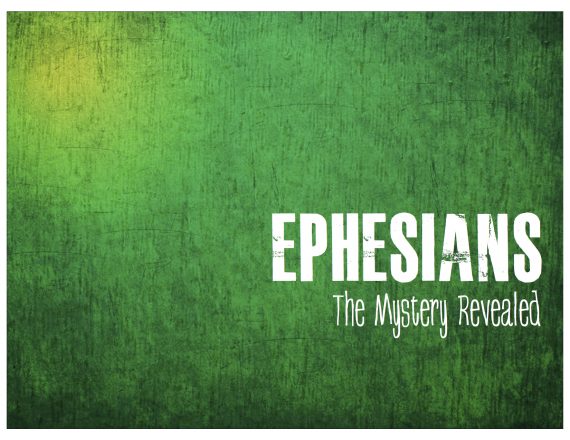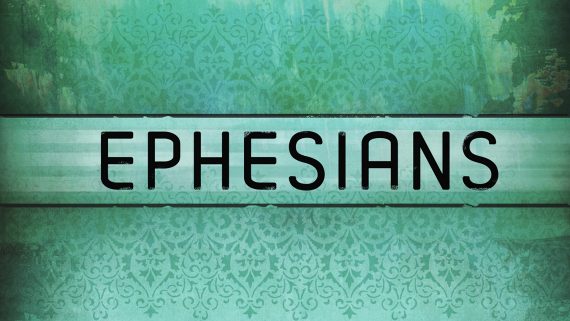In Ephesians 2, Paul encouraged his readers to live in peace with people they used to hate. Since this is much easier said than done, Paul begins Ephesians 3 by showing how he himself is living in peace with those who used to be his enemies. Indeed, Paul is prison as a result of his stand for peace, but Paul knows that this will only serve to prove the truth of what he is teaching. Paul leads by example, just as we, the church, are to be an example to the world. This is what we begin to learn in this study of Ephesians 3:1-7.
Prior to that, however, we consider a question from a reader about the traditional teaching on hell.

Question from a Reader
Hi, Jeremy! I would just like to ask because I still get anxiety over hell. What are we to do with testimonies about hell? Sometimes I think that it may be from God redirecting us. But I also believe that there might be no hell. The only thing stopping me from holding that view are the testimonies and books saying it’s divine revelation.
I have written a book about hell titled “What is Hell?” and in it, I challenge the three main views about hell and show what the Bible actually teaches regarding the doctrine of hell. It’s a shocking and surprising book, and I encourage you to read it.
Regarding the various testimonies and visions of hell that some people claim to have, I tend to be very skeptical about them, for three reasons.
First, we must always be skeptical of any vision, dream, or testimony that is not found specifically in Scripture. Scripture is the ultimate written revelation from God, and so all other forms of revelation must be filtered through the lens of Scripture. In my understanding of Scripture, there are no direct visions or revelations of hell as a place of suffering torture and everlasting burning, and so any dream or vision that a person today has which claims to have seen hell as such a place is suspect by default, for it contradicts the Bible.
 Second, the human mind is quite susceptible to the power of suggestion. This is also true of dreams. I am sure you have noticed that quite often, your dreams somewhat follow the events or experiences or worries that have been most at the forefront of your mind during the previous few days. If you are worried about a test at school, or presentation at work, or some situation with your spouse, you are likely to have some dreams about these things.
Second, the human mind is quite susceptible to the power of suggestion. This is also true of dreams. I am sure you have noticed that quite often, your dreams somewhat follow the events or experiences or worries that have been most at the forefront of your mind during the previous few days. If you are worried about a test at school, or presentation at work, or some situation with your spouse, you are likely to have some dreams about these things.
I often find that when I am studying a particular text of Scripture and am struggling with it, I will have dreams about the text. If I am working on a problem with my car, I might have dreams about fixing my car. If I am preparing for a trip, I might have dreams about the upcoming trip.
The same thing happens with dreams about hell. I have found that when people have dreams about hell, it is usually because they have been thinking a lot about hell in the previous days and weeks. Maybe they have been reading and studying a lot about it. Maybe they have heard some pastors preach or teach about it. Maybe they have been extremely worried about it. Maybe a loved one passed away and they are afraid that their loved one is in hell. And so then they have dreams about hell. And since the concept of hell as a place of burning torture is so common, the dreams of hell as a place of torture are quite vivid. The more vivid your dreams are, the more you remember them. So people dream about hell, and the dreams are quite vivid, and so people will often tell others about these dreams. They might even write books about them.
But note that that the fact that they had these dreams does not prove that the dreams show what hell is really like. All it shows is that they were thinking or worried about hell, and so had a dream which helped their mind sort through and deal with some of the thoughts and worries that were on their mind. That is where most of these dreams seem to come from … not necessarily from God.
Third, and somewhat in support of the second point, any human can have these sorts of dreams and visions. I have frequently encountered non-Christian people who tell stories about visions or dreams of a place of suffering and torture in the afterlife. Muslims have these. Pagans (as in people who follow Norse mythology such as that of Odin and Thor) have these sorts of stories. The ancient Egyptians had these sorts of stories.
 This doesn’t mean that all such dreams and visions are correct or incorrect. It just means that stories of a place of burning and suffering after this life are not unique to Christianity, and so we have to wonder about the spiritual source of all such dreams and visions. And who is more likely to want people to live in fear about the after life? God or Satan?
This doesn’t mean that all such dreams and visions are correct or incorrect. It just means that stories of a place of burning and suffering after this life are not unique to Christianity, and so we have to wonder about the spiritual source of all such dreams and visions. And who is more likely to want people to live in fear about the after life? God or Satan?
Second Timothy 1:7 says that God has not given us the spirit of fear; but of power, and of love, and of a sound mind. God is a God of peace; not of fear, punishment, and torture.
So in my view, any human testimony about a dream or vision of hell which leads people to live in fear of God or fear for the after life is not something that comes from God. Therefore, I do not give any credibility to these visions of hell that some people claim to have. God does not threaten us into a relationship with Him, but woos us with love and promises of peace and safety.
This concept of God as a God of peace helps transition into our study of Ephesians 3:1-7.
A Prisoner for Jesus (Ephesians 3:1-7)
So far in Ephesians, Paul has explained the riches and inheritance that is ours in Jesus Christ (Ephesians 1) and how Jesus revealed the way to live in peace with those people we used to hate (Ephesians 2). Now, in Ephesians 3, Paul goes on to encourage the Ephesians Christians to follow the example of Jesus and live in peace with each other also, so the world can learn from us and begin to live in peace with each other as well.
I want to remind you that many people read Paul’s letter to the Ephesians quite differently than this. As a result, they often don’t really know what to do with Ephesians 3:1-13 since these verses don’t really seem to fit with what they think Paul is saying. So when you read most commentaries or listen to pastors teach Ephesians 3:1-13, they often refer to it as an “aside.” It is thought to be one of Paul’s famous “rabbit trails” where he goes off onto some tangent that doesn’t really have much to do with anything else he is saying, and then finally returns to his main point in Ephesians 2:14.
One of the primary reasons people think this is because of those repeated words in Ephesians 3:1 and 3:14, “For this reason.” It is thought that Paul begins a point in Ephesians 3:1 by saying “For this reason” but then gets sidetracked to talk about being in prison and how the church is a mystery, until he finally returns to this main point in Ephesians 3:14 by repeating the phrase “For this reason.”
When I first taught Ephesians about twenty years ago, this is how I taught it.
But I have since come to a completely different understanding of the message of Ephesians, and in my new understanding, Paul’s words in Ephesians 3:1-14 are not a tangent, not a rabbit trail, but are rather a perfectly logical follow-up point from what Paul has written so far in this letter.
Paul’s primary point in Ephesians can be summarized in one word: “Peace!” Through Jesus, there is peace with God, peace with one another, and together, all of us are working toward universal peace (which includes bringing the principalities and powers back into their proper place).
So Paul’s point in Ephesians 3 is that he wants the Ephesian Christians to live at peace with each other. This follows naturally from what Paul has just written in Ephesians 2 about how Jesus showed us the way to live in peace with each other.
The reason we are to leave in peace with one another is because the world doesn’t know how to attain peace, and if we live at peace with each other, the world will learn how to live in peace by watching us and learning from us.
And Paul knows that before he can ask the Ephesian Christians to live in peace with each other, he needs to show them how he himself is following the example of Jesus. This is what Paul explains in Ephesians 3:1-13, how he himself is following the example of Jesus is seeking peace with others.
I am not going to be able to cover this entire section in this one study, so we will split it up into two, looking at Ephesians 3:1-7 this time, and Ephesians 3:8-13 next time.

Ephesians 3:1. For this reason I, Paul, the prisoner of Christ Jesus for you Gentiles …
Paul begins by pointing out that his attempt to follow Jesus into the way of peace ended up with him in prison. As Paul writes this letter to the Ephesians, he is sitting in a prison in Rome.
Of course, even though he is a prisoner in Rome, Paul does not consider himself a prisoner of Rome. Paul says that he is a prisoner of Christ Jesus. Paul knows that he is right where Jesus wants him to be.
Indeed, prison is the natural and normal consequence for someone who seeks peace in a world filled with violence.
When Jesus sought peace, He ended up on a cross. So also, Paul’s quest for peace led him to prison, where he himself might die.
Yet when peace is the goal, imprisonment and possible death is better than violence and bloodshed. And in a world that is ruled and dominated by violence, those who seek peace are viewed as the enemies, who must be silenced, imprisoned, or killed.
So Paul is is prison because he followed Jesus into the way of peace.
Finally, Paul writes that he is a prisoner for you Gentiles. This does not mean that Paul was a prisoner because of the Gentiles. He is not blaming the Gentiles, especially not the Gentile Christians in Ephesus. Instead, Paul is saying that he is a prisoner “as an example” for the Gentiles, or as a way to reach the Gentiles with the truth that they too are now accepted into the family of God.
Paul is saying, “I’m in prison for your sake, to help you, to show you how this whole ‘peace’ thing works.”
We know this is what Paul means because he goes on in Ephesians 3:2-13 to explain how peace works.
Ephesians 3:2. … if indeed you have heard of the dispensation of the grace of God which was given to me for you …
The word dispensation is a word we don’t use very much anymore. We saw it previously though in Ephesians 1:10. The Greek word is oikonomia. Oiko means house, and nomia means law, so oikonomia means “law of the house.” It is the rules by which a house or business is governed. Synonyms could be “management, stewardship, or an orderly arrangement.”
In Ephesians 3:2, Paul says that a dispensation was given to him, and so we could say, as some of your translations do, that he was given a stewardship—he was made a steward or a manager over a certain task or responsibility. Paul was given specific guidelines from God by which he should live and function.
What were these guidelines? Well, the verse says that he was a steward of the grace of God which was given to me for you. Paul was sent by God to declare peace to the Gentiles. To declare that there are not more outsiders and insiders, but that all are “insiders” with God.
As the apostle to the Gentiles, Paul was the person God chose to take the message of peace to the Gentiles.

Ephesians 3:3-4. … how that by revelation He made known to me the mystery (as I have briefly written already, by which, when you read, you may understand my knowledge in the mystery of Christ),
This message of peace to the Gentiles was something unknown to Jewish people prior to the ministry of Jesus and apostleship of Paul. Most Jews thought that God could accept Gentiles into His family, but only if they first became Jewish and kept the Mosaic Law. But Paul was showing that Jesus opened the door for all people, Jew and Gentile alike, to join the family of God. Everybody was on equal footing before God.
Now Paul says he already wrote to them about this, which he did in two places already: Ephesians 1:9-10 and Ephesians 2:11-22. We discussed this mystery there as well, so we can now move on.
Ephesians 3:5. … which in other ages was not made known to the sons of men, as it has now been revealed by the Spirit to His holy apostles and prophets:
The reason Paul refers to this truth as a mystery is because few people saw or understood the truth of it until Jesus revealed it and Paul proclaimed it.
The idea that all people were on equal footing with God was a shocking idea for most people in Paul’s day (cf. Acts 10-15; Galatians). The idea that God wanted to love and accept all people is definitely taught all over the place in the Hebrew Scripture, but it was such a challenging idea, most Jewish people didn’t understand it or believe it. It was a hidden truth. It was a mystery to them.
In previous ages, humans have always operated under the “us vs. them” principle, which was a principle of rivalry, violence, and death (cf. Ephesians 2:1-3). But now we have a new revelation by the Spirit through the prophets and apostles, that all of us are one, and our struggle is not against each other (cf. Ephesians 6:12).
But Jesus revealed the truth of God’s love for all, and Paul has learned this truth as well, and so is now declaring it to the world. Jews and Gentiles can now live in peace with each other because both are equal footing before God. This is what Paul writes in Ephesians 3:6.

Ephesians 3:6. … that the Gentiles should be fellow heirs, of the same body, and partakers of His promise in Christ through the gospel …
So instead of division, strife, and rivalry, we are all one family, fellow heirs of God, recipients of the promises (Ephesians 1:3-14; 2:11-22).
Previously, only the Jews were heirs. Only the Jews had promises and covenants from God. Only the Jews were allowed near to God. Only the Jews had forgiveness of sins from God.
But now they are being allowed in. Now they are being grafted into the body. Now they can partake—or share—in the promise of God! This is the mystery. It seems clear to us, but that is because it has been revealed to us.
Jews who lived prior to Paul did not see this clearly. “No one knew the full meaning of God’s promise to Abraham that “in you all the families of the earth shall be blessed” (Gen 12:3) until Paul wrote, “And the Scripture, foreseeing that God would justify the Gentiles by faith, preached the gospel beforehand to Abraham, saying, ‘All the nations shall be blessed in you’” (Gal 3:8).
In Ephesians 3:7, Paul states that he effectively carried out this task of revealing the mysterious message of peace to the Gentiles.
Ephesians 3:7. … of which I became a minister according to the gift of the grace of God given to me by the effective working of His power.
The word minister comes from the Greek word diakonos, which could also be translated as deacon. Many churches have deacons. This is where that title comes from. A deacon is someone who serves in the church. They are those men and women who have the God given ability to see what needs to be done and do it – no matter how menial. They are wonderful people to have in a church – deacons and deaconesses. That is Paul’s picture of himself in Ephesians 3:7. He calls himself a diakonos, a minister. He was a minister.
Paul is just saying that this ministry was a gift given to him by God. The term effective working is the Greek word energion from which we get our word energy, and the word power us the Greek word dunamis from which we get our word dynamite. God was working in Paul with energy like dynamite to carry out the task given to him.

And all of this divine energy and power to perform a ministry to the Gentiles led Paul directly into prison. A lot of times we think that when we have divine power and energy to perform our God-given ministry, we will be led into popularity and fame. But when Jesus followed God, He ended up on the cross. When Paul followed his calling, he ended up in prison.
Now, Paul is not done with this point about why he is in prison for following Jesus into the way of peace. He explains more in Ephesians 3:8-13, which we will cover next time. We will see that as a result of preaching peace to the Gentiles, this threatened the principalities and powers of this world, and so they put Paul in prison. However, by not fighting violence with violence, Paul was able to show the church, the world, and even the fallen powers of this world, that there was a better way to peace.
In Ephesians 2, Paul wrote to the Ephesian Christians (and therefore to us as well), that we, as the church, are to lead the world into the way of peace by being an example to them of how to live in peace with people who used to be our enemies. But Paul knows that this is easier said than done, and so in the first part of Ephesians 3, Paul is showing the church how he himself is an example to them about how to live in peace with others.
Paul is in prison as a result of his stand for peace, but Paul knows that this will only serve to prove the truth of what he is teaching. Paul leads by example, just as we, the church, are to be an example to the world. This is what we have begun to learn in this study of Ephesians 3:1-7, and we will pick back with Paul’s point next time in Ephesians 3:8-13.
Join Our Telegram Group : Salvation & Prosperity










